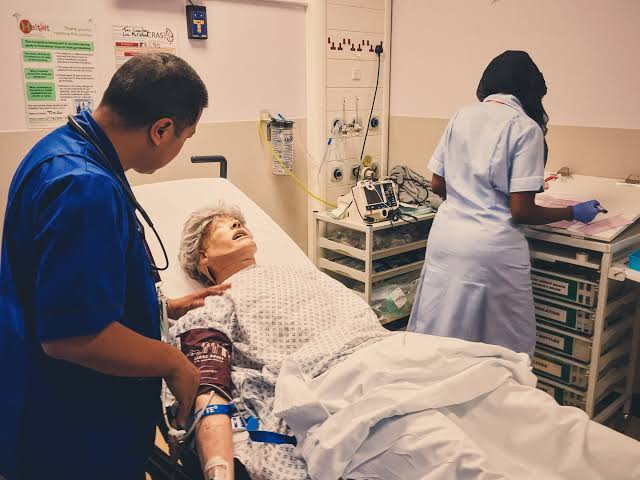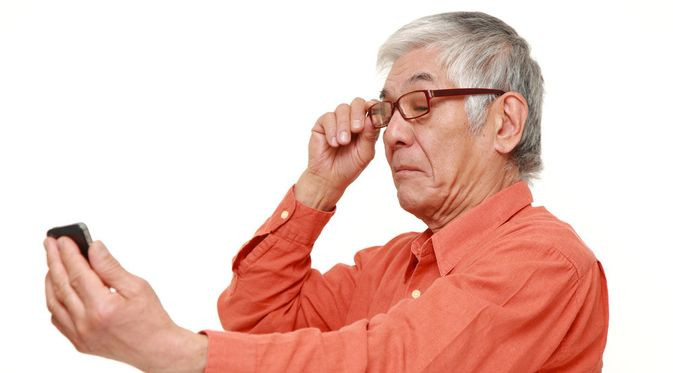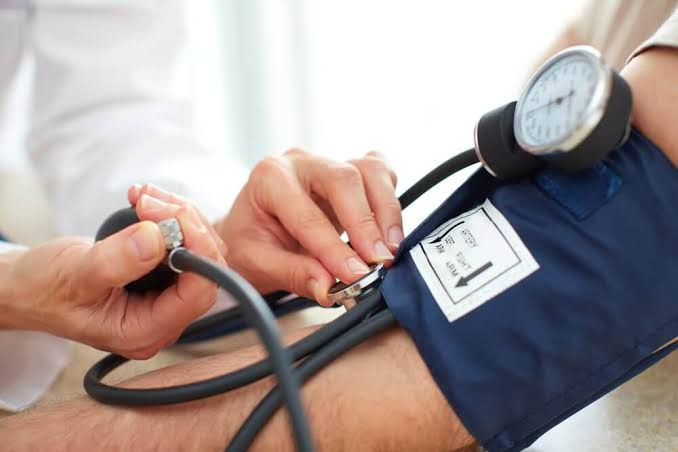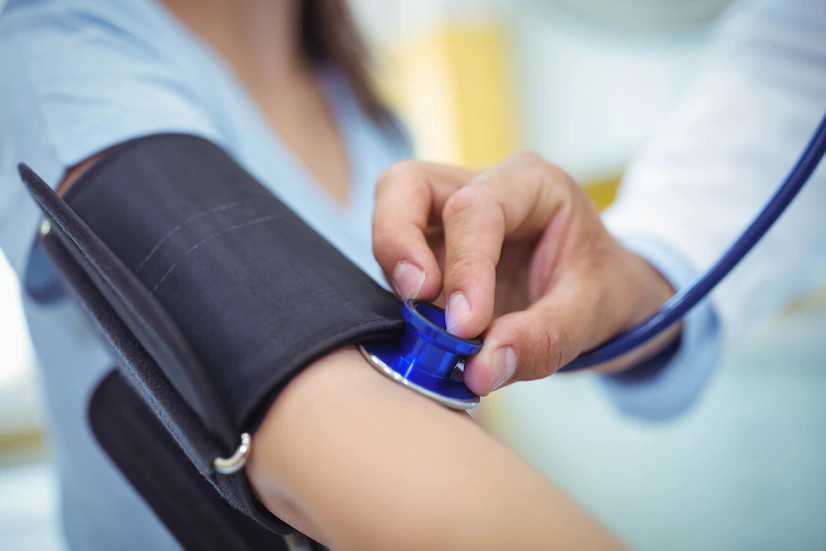Definisi
Hipertensi adalah istilah medis untuk peningkatan tekanan darah di atas nilai normal. Tekanan darah diukur menggunakan alat sphygmomanometer. Alat ini menunjukan hasil berdasarkan dua jenis tekanan darah yaitu tekanan sistolik dan diastolik.
Tekanan sistolik menggambarkan tekanan di dalam pembuluh darah saat jantung memompa darah ke seluruh tubuh. Sedangkan tekanan diastolik mengacu pada tekanan di dalam pembuluh darah saat jantung beristirahat di antara masing-masing detak. Pengukuran tekanan darah memiliki satuan milimeter air raksa (mmHg).
Sebuah sphygmomanometer menampilkan pembacaan tekanan sistolik di atas pembacaan tekanan diastolik. Sebagai contoh, jika seseorang memiliki tekanan darah normal, monitor akan menampilkan tekanan sistolik <120 mmHg dan tekanan diastolik <80 mmHg (<120/80 mmHg).
Hipertensi dibagi menjadi dua stadium, yaitu:
- Hipertensi stadium 1, ketika tekanan sistolik menunjukan angka 130-139 mmHg atau tekanan diastolik mencapai 80-89 mmHg
- Hipertensi stadium 2, merupakan bentuk yang lebih parah, yaitu ketika tekanan sistolik ≥140 mmHg atau tekanan diastolik ≥90 mmHg
Sementara, tekanan sistolik 120-129 mmHg dan tekanan diastolik >80 mmHg disebut dengan pra-hipertensi.
Menurut Pusat Pengendalian dan Pencegahan Penyakit (CDC), 45% orang dewasa di Amerika Serikat menderita hipertensi. CDC juga memperkirakan bahwa hanya 1 dari 4 orang dewasa yang hipertensinya terkendali.
Hipertensi yang tidak terkontrol dapat menyebabkan peningkatan tekanan darah yang tiba-tiba dan parah. Peningkatan ini dikenal sebagai krisis hipertensi. Krisis hipertensi terjadi ketika tekanan darah meningkat dengan ekstrim yaitu tekanan sistolik >180 mmHg dan/atau tekanan diastolik ≥120 mmHg.
Jika tidak diobati, krisis hipertensi akan merusak pembuluh darah dan organ-organ tubuh. Pembuluh darah akan meradang dan bocor, sehingga mengeluarkan cairan atau darah. Akibatnya, jantung tidak dapat memompa darah dengan baik ke seluruh tubuh.
Ada dua jenis krisis hipertensi, yaitu:
- Hipertensi urgensi, atau krisis hipertensi tanpa gejala terkait. Pada krisis hipertensi ini, umumnya belum terjadi kerusakan organ. Jika tidak segera ditangani, bukan tidak mungkin dapat memberat dan menimbulkan kerusakan organ
- Hipertensi emergensi, atau krisis hipertensi dengan gejala. Pada krisis hipertensi ini, sudah terdapat kerusakan organ. Hipertensi emergensi berkaitan dengan komplikasi yang mengancam nyawa
Sekitar 1-2% orang dengan hipertensi akan mengalami krisis hipertensi. Pada tahun 2018, hampir setengah juta kematian di AS disebabkan oleh hipertensi.
Penyebab
Dilansir dari The American Heart Association (AHA), terdapat beberapa gaya hidup dan faktor medis yang dapat meningkatkan risiko hipertensi, seperti:
- Kelebihan berat badan atau obesitas
- Makan makanan yang tidak sehat, termasuk tinggi garam
- Jarang melakukan aktivitas fisik atau olahraga
- Merokok
- Memiliki riwayat penyakit jantung dan pembuluh darah
- Memiliki masalah kesehatan tertentu, seperti diabetes atau penyakit ginjal
Sementara, faktor-faktor berikut umumnya terkait dengan krisis hipertensi, yaitu:
- Tidak meminum atau lupa meminum obat darah tinggi yang diresepkan
- Minum obat yang berinteraksi satu sama lain dan memiliki efek meningkatkan tekanan darah
- Menggunakan obat-obatan terlarang, seperti kokain atau amfetamin
- Memiliki penyakit jantung dan pembuluh darah yang mengancam jiwa, seperti stroke atau serangan jantung
- Mengalami gagal organ, seperti gagal jantung atau ginjal
Faktor Risiko
Faktor risiko krisis hipertensi antara lain:
- Wanita
- Obesitas
- Usia lanjut, terutama pada hipertensi emergensi
- Ketidakpatuhan minum obat darah tinggi
- Memiliki penyakit jantung, ginjal, dan stroke
- Diabetes dan hiperlipidemia (kelebihan kolesterol darah), terutama pada hipertensi emergensi
- Konsumsi alkohol
- Penggunaan obat-obat terlarang
Gejala
Beberapa orang yang mengalami krisis hipertensi dapat memiliki gejala, sementara yang lain mungkin tidak memiliki gejala sama sekali.
Orang yang bisa memeriksa tekanan darah sendiri akan mendapatkan nilai tekanan darahnya mencapai 180/120 mmHg atau lebih. Jika tidak ada gejala, AHA merekomendasikan untuk beristirahat dahulu selama 5 menit lalu memeriksa ulang tekanan darah. Jika hasilnya masih tinggi, orang tersebut harus berkonsultasi ke dokter untuk mendapatkan saran lebih lanjut.
Jika mengalami krisis hipertensi disertai satu atau lebih gejala terkait, orang tersebut mengalami hipertensi emergensi dan harus segera menghubungi nomor telepon darurat atau segera dibawa ke unit gawat darurat. Gejala terkait hipertensi emergensi antara lain:
- Sakit kepala parah atau migrain
- Pusing
- Kebingungan
- Kecemasan parah
- Mual atau muntah
- Nyeri dada
- Gangguan penglihatan
- Sesak nafas
- Mimisan
- Kejang
- Penurunan kesadaran
Diagnosis
Dokter akan melakukan beberapa kali pemeriksaan tekanan darah dan bertanya tentang gejala dan riwayat kesehatan pasien. Dokter juga akan menanyakan obat atau suplemen yang dikonsumsi pasien dan apakah pernah menggunakan narkoba atau tidak.
Jika dokter mencurigai adanya risiko kerusakan organ akibat krisis hipertensi, dokter akan merekomendasikan tes lebih lanjut, seperti:
- Tes darah
- Tes urin
- Pemeriksaan mata
- Ekokardiografi atau USG jantung
- USG hati, ginjal, atau keduanya
- Rontgen dada untuk menilai jantung dan paru-paru
- CT atau MRI scan otak
Tata Laksana
Pengobatan lini pertama untuk krisis hipertensi adalah obat antihipertensi yang diberikan melalui suntikan ke pembuluh darah. Obat ini berfungsi untuk menurunkan tekanan darah dengan lebih cepat dibandingkan obat oral atau obat minum.
Dokter biasanya menurunkan tekanan darah tidak lebih dari 25% pada satu jam pertama, karena penurunan tekanan darah yang terlalu cepat dapat menyebabkan masalah lain.
Setelah tekanan darah terkendali, dokter akan beralih menggunakan obat antihipertensi oral (minum). Obat-obatan yang digunakan dokter untuk menurunkan tekanan darah disesuaikan dengan beberapa kondisi pasien, termasuk:
- Apakah pasien hamil atau tidak
- Apakah pasien memiliki riwayat penyakit lainnya
- Apakah krisis hipertensi terjadi karena penggunaan obat-obatan terlarang atau bukan
Komplikasi
Seiring waktu, tekanan darah tinggi yang tidak diobati dapat menyebabkan komplikasi, seperti:
- Penyakit jantung, termasuk serangan jantung dan gagal jantung
- Stroke
- Gangguan penglihatan hingga kebutaan
- Gagal ginjal
- Disfungsi ereksi (Impotensi)
- Penumpukan cairan di paru-paru
- Gangguan memori
Sementara, krisis hipertensi dapat menimbulkan beberapa komplikasi berikut:
- Kerusakan pembuluh darah yang menyebabkan kerusakan organ tahap akhir
- Serangan jantung
- Penumpukan cairan di paru-paru
- Robeknya pembuluh darah aorta (pembuluh darah besar yang mengedarkan darah ke tubuh)
- Eklampsia atau kejang pada ibu hamil
- Pendarahan otak
- Kematian
Pencegahan
Hal terpenting untuk mencegah krisis hipertensi adalah meminum obat tekanan darah sesuai anjuran dokter. Sebuah studi tahun 2015 menemukan bahwa orang yang sering tidak minum obat darah tinggi lebih berisiko dirawat di rumah sakit karena masalah jantung.
Berikut adalah beberapa perubahan gaya hidup untuk menurunkan tekanan darah dan mengurangi risiko krisis hipertensi:
1. Diet sehat
Diet sehat adalah diet kaya buah-buahan, sayur-sayuran, serat, serta rendah lemak dan garam. Mengurangi konsumsi garam dapat mempercepat penurunan tekanan darah.
The National Heart, Lung, and Blood Institute menyarankan diet DASH (Dietary Approaches to Stop Hypertension) bagi pasien hipertensi untuk menurunkan tekanan darahnya. Diet ini berupa mengontrol asupan kalori yang menyehatkan jantung.
2. Kurangi konsumsi alkohol
Membatasi asupan alkohol akan membantu menurunkan tekanan darah dan meningkatkan kesehatan secara keseluruhan. Pedoman Diet 2020-2025 untuk Orang Amerika merekomendasikan pria sebaiknya mengonsumsi tidak lebih dari dua gelas per hari, sedangkan wanita tidak boleh mengonsumsi lebih dari satu gelas per hari.
3. Aktivitas fisik atau olahraga rutin
Rutin bergerak atau berolahraga dapat menjaga kesehatan jantung dan pembuluh darah. Olahraga juga membantu menurunkan berat badan berlebih, yang juga akan membantu menurunkan tekanan darah.
CDC merekomendasikan 150 menit aktivitas aerobik sedang atau 75 menit aktivitas aerobik berat setiap minggunya. Namun, aktivitas ini disesuaikan dengan kondisi setiap pasien.
4. Hindari merokok
Merokok meningkatkan tekanan darah dan risiko masalah jantung, seperti serangan jantung dan stroke. Orang yang merokok perlu berkonsultasi dengan dokter mengenai program berhenti merokok.
5. Tidur cukup
Tidur yang cukup sangat penting untuk kesehatan secara keseluruhan, terutama untuk kesehatan jantung dan pembuluh darah. Hal ini terjadi karena tekanan darah akan menurun saat tidur. Idealnya, orang dewasa tidur minimal 7 jam setiap malam.
Beberapa langkah berikut dapat membantu tidur Anda menjadi teratur dan berkualitas:
- Banyak beraktivitas fisik dalam sehari
- Bangun dan tidur pada jam yang sama setiap harinya
- Mengikuti rutinitas waktu tidur Anda dengan konsisten
- Pastikan lingkungan Anda nyaman untuk tidur, sejuk, gelap, dan bebas dari kebisingan atau gangguan lainnya
Kapan harus ke dokter?
Konsultasi ke dokter jika pengobatan darah tinggi yang Anda jalani tidak berhasil menurunkan tekanan darah. Diperlukan waktu hingga dua minggu agar obat baru memiliki efek penuh. Tidak adanya perubahan pada tekanan darah berarti diperlukan pengobatan lain atau bisa juga disebabkan oleh masalah lain yang terjadi bersamaan dengan tekanan darah tinggi.
Jika Anda menderita darah tinggi, segera cari pertolongan medis darurat apabila Anda mengalami:
- Gangguan penglihatan mendadak
- Sakit kepala
- Kelelahan
- Mual dan muntah
- Kebingungan
- Sesak nafas
- Nyeri dada
- Kejang
- Penurunan kesadaran / pingsan
- dr Nadia Opmalina
Shepa SG. (2021). Hypertensive crisis: what are the symptoms?. Retrieved 3 April 2022, from https://www.mayoclinic.org/diseases-conditions/high-blood-pressure/expert-answers/hypertensive-crisis/faq-20058491
Lewsley J. (2021). What to know about hypertensive crisis. Retrieved 29 March 2022, from https://www.medicalnewstoday.com/articles/hypertensive-crisis
High blood pressure and hypertensive crisis. (2021). Retrieved 29 March 2022, from https://www.webmd.com/hypertension-high-blood-pressure/guide/hypertensive-crisis
High blood pressure symptoms. (2018). Retrieved 29 March 2022, from https://www.healthline.com/health/high-blood-pressure-hypertension-symptoms
Barhum L. (2020). What is a hypertensive crisis? Retrieved 29 March 2022, from https://www.verywellhealth.com/hypertensive-crisis-5089030












